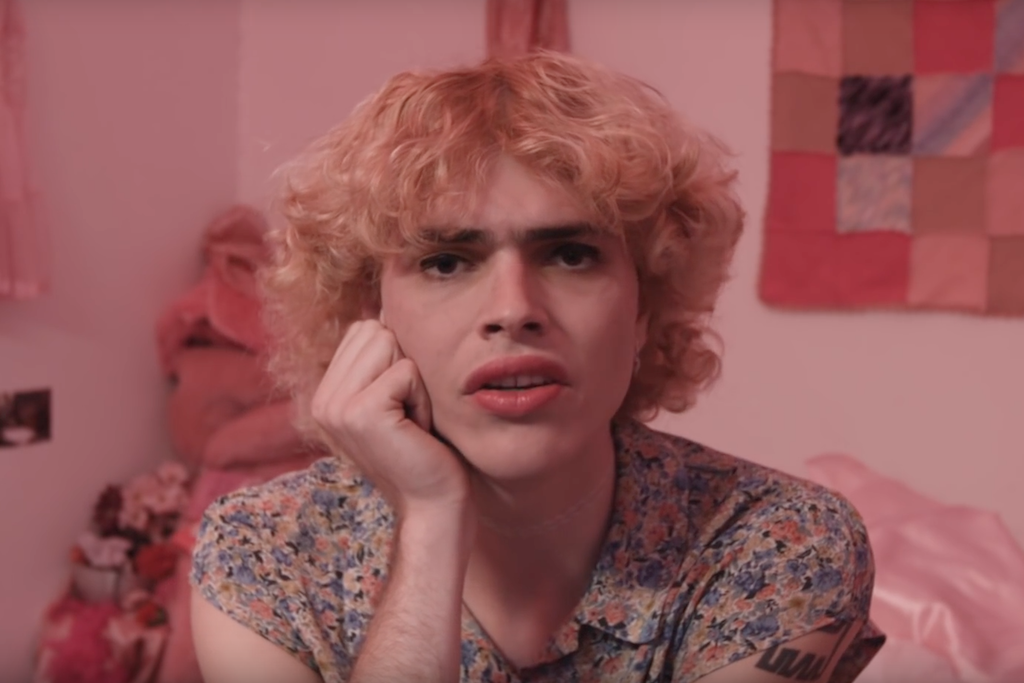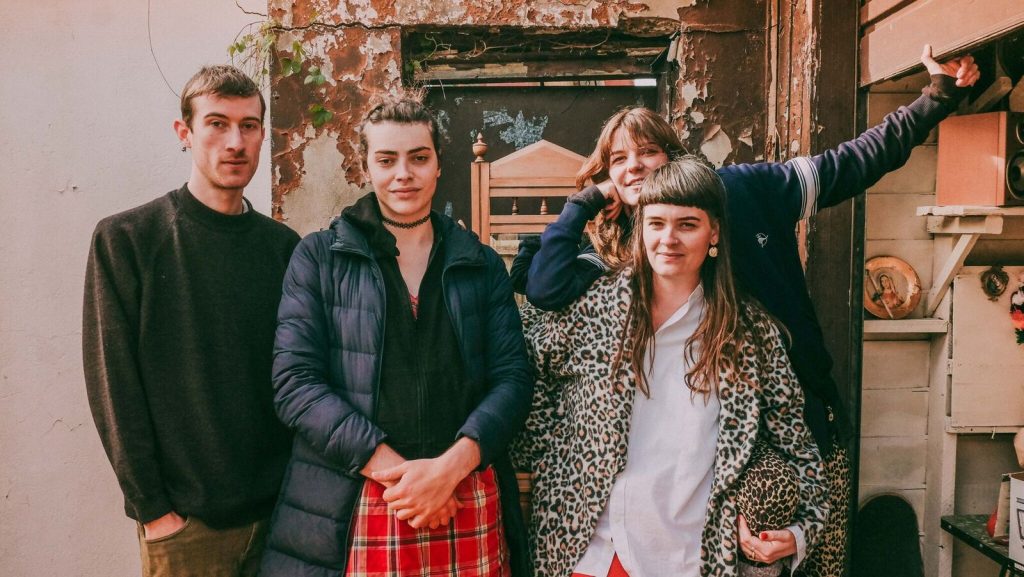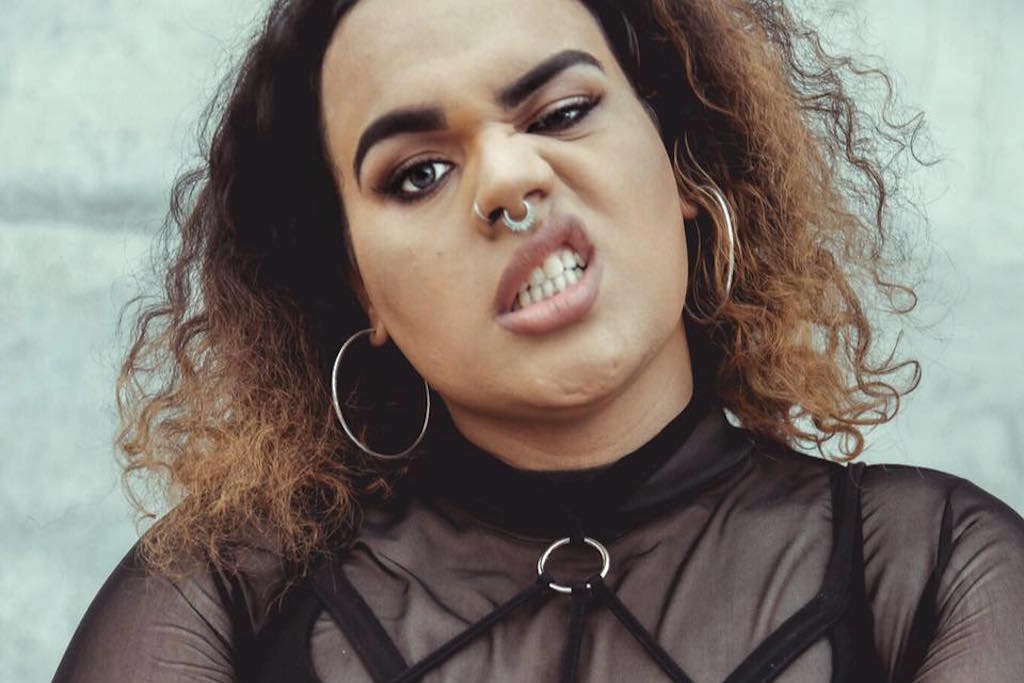June Jones Is Australia’s Best New Music Brat
"I'm speaking about my experience, I'm not speaking for anyone else."

It’s another busy day in another busy year for June Jones, the singer, guitarist and radiant heart of Melbourne emotion punk band Two Steps on the Water.
The test pressing of the band’s second LP, Sword Songs, has arrived, and the bus ride to her bandmate Sienna’s house to confirm its aural integrity is the only free moment she has all day for our interview. If she’s at all self-conscious about speaking in detail about her life and artistic practice over the phone on public transport, she doesn’t show it. Even when speaking softly, she’s as forthright and vibrant as ever.
June formed Two Steps on the Water in 2014 with violinist and singer Sienna Thornton and drummer Jonathan Nash — Ellah Blake joined the band on keys this year — and through three EPs and two albums, the picture she has painted of the many facets of her life and experience as a trans woman is one blissfully unconcerned with an audience other than herself, yet has attracted a substantial one regardless.
She combines incidental details of hard-won femininity — clean shaves, laddered tights — and dramatic evocations of a hazardous world and the necessity of finding and expressing fierce, fathomless love within it.
In the opening song ‘Camouflage’ you sing, “And if you’re feeling terrified / it can help to feel a little terrifying”. Then throughout the rest of the album there are lots of references to monsters and venomous animals, both being them and being afraid of them. It’s such an extraordinary rendering of the trans and queer experience of being made to feel monstrous, and in any given moment either rejecting it or finding a way to embrace it.
That almost makes me sound smarter than I am. I just like the feel of fantasy, slightly medieval, almost video game imagery. Spencer Krug [Wolf Parade, Sunset Rubdown, Moonface] does it a lot, and I’ve always found it really easy to relate to as a metaphor. I find some metaphors really too subtle for me.
It’s funny how the monster can be this unknown thing that you’re facing and that you’re afraid of, but it can also be this thing that you’re characterised as. There’s this real injustice when someone tells you that you are the very thing that you’ve been afraid of your whole life. It’s just a classic example of a brutal mischaracterisation that can really fuck with us.
But sometimes we want to be the monster because it’s the most powerful thing that you can be, because we know how terrifying it is to be on the other side. Everyone’s just trying to get control in their lives and get a sense of power. In ‘Camouflage’ it’s just acknowledging that can be a way for traumatised people to — I’m speaking more about my experience, I’m not speaking for anyone else.
But sometimes I put on a bit of a tough facade when I’m out in public, because I’ve had enough of people fucking with me.
There’s such a strong feeling of catharsis in your voice and in your lyrics. What do you think is gained from pairing your words with such rich and distinctive instrumentation, rather than a traditional rock band set-up?
It wasn’t a super conscious decision to do it like that at the beginning. But I’m lucky in that when we play live — because there’s not a hugely distorted guitar, the sounds of the band will rarely drown out the lyrics.
“I’m speaking more about my experience, I’m not speaking for anyone else”
I feel like sometimes when I go and see a rock band or a punk band, the singer will find it really hard for their lyrics to be audible over a couple of distorted guitars and a bass and pounding drums. So I think that’s a real advantage, our set-up rarely interferes with the vocals being audible.
Apart from that, I think we just play the kind of music that we’re drawn to. None of us are huge rock dogs. I think we all have a few bands that we can really get into, but definitely Sienna and I tend to come back to the singer-songwriter, more folky kind of stuff, a bit more pared back in what we listen to.
It’s just fun playing with a combination of things that isn’t super common, to have like really emo-folk music slash really-folk-emo music.
You’ve described Two Steps on the Water as an “emotion punk band” and you’ve spoken before about the influence of emo on your music. Can you tell us more about your history with emo?
In early high school I was a devotee of the church of capital R, capital P, capital M, Real Punk Music. I really had a very narrow idea about what that was, and what was good.
It was such a typical high school music elitist kind of thing — “I listen to real music and good music, what you listen to is bad and fake and manufactured and therefore doesn’t mean anything.” Which is just the biggest farce, the biggest joke that I’ve ever played on myself — because I was just a bleeding heart emo at my core, denying myself the lifeblood that I needed, which was just really sad femme kind of sissy music.
I think I found my version of it in other stuff after I got out of being obsessed with this one idea of punk music. It’s almost a little sad because the music that I was finding emo qualities in was Dinosaur Jr, Sonic Youth, that kind of grunge-y stuff that was more melodic. And I guess then like Blonde Redhead, but none of these are emo bands according to pretty much anyone’s definition.
It wasn’t until a few years ago where I started getting into that broader kind of emo, screamo, sort of post-hardcore stuff. I’m sure the bands that I would name would be looked down upon by the emo purists, because that’s a whole thing.

Photo by Naomi Lee Beveridge
But one of the influences for starting Two Steps was this band called La Dispute. They’re like a pretty new — I think they’ve been around for six or seven years. They’re a post-hardcore band, some kind of like slightly emo, slightly screamo influences, but a lot of yelling. You know, emotional yelling.
I remember when I started Two Steps I wanted to make something that sounded like halfway between La Dispute and Laura Jean, who had just put out her self-titled record, which is very folky and beautiful and soft and smart. I was just like, “How can I do something that’s like that but also so emo, kind of like not composed?” Then I went back through the archives and got into some classic emo stuff.
It’s funny, there’s this elitism that people have about ’90s emo, and even with that there’s people who are like “This is the good ’90s emo, and this is the bad ’90s emo”. It wasn’t until I started dating my current girlfriend that I got into the stuff that the elitists won’t touch, which is the 2000s bands like The Used and Alexisonfire and My Chemical Romance and stuff. My girlfriend Millie made me a playlist on Valentine’s Day this year, all of that early to mid-2000s emo, screamo and metalcore. It’s been my favourite thing to listen to this whole year.
Do you ever write with a particular audience in mind? Are you conscious while writing of how your songs could be received?
Not really. I don’t think I really imagine anyone but myself, but I do have an instinctive urge to make something that’s not like pop music, but not — I enjoy trying to make a song that is concise and has pop qualities. So I guess what I’m saying is I don’t let my freak flag fly completely all of the time, but I don’t really imagine a particular audience.
I was thinking of your role — the role that’s kind of been placed upon you as one of only really a few prominent trans women in Australian music — and everything that comes with that visibility, and the kind of people that you think might be really drawing something from your songs and hearing these kinds of sentiments expressed.
I guess I try not to put any pressure on myself to be a certain thing, and I’m pretty much just doing what feels good for me.
Actually, I think if there’s an audience I have in mind, it’s me at age 14. There are songs that I write that are meant to be if not inspirational, then at least hopeful. A song like ‘Camouflage’, that’s really again directed at me. I’m a very self-centred person, and I fear that if I imagined my audience too much, then I would let that get to my head a bit.
Music is the most fun thing I’ve ever found in my life and that’s why I never went to uni for it or anything, because I’m so afraid of having my passion for doing it crushed by some kind of external pressure, a pressure beyond just what I want to do with it. So basically, I guess I’m a music brat.
I had my fingers crossed just now, “Is there going to be a great closing sentence?” And then you said “music brat”, and I’m like: “We’re done.”
You should just call the whole interview “Chloe Alison Escott Speaks With June Jones, Music Brat”.
“Australia’s top music brat finally lashes out.”
—
Two Steps On The Water’s new album Sword Songs is out now independently.
—
Chloe Alison Escott is a musician, comedian and writer from Hobart. You can follow her on Twitter at @vesselskirt.

